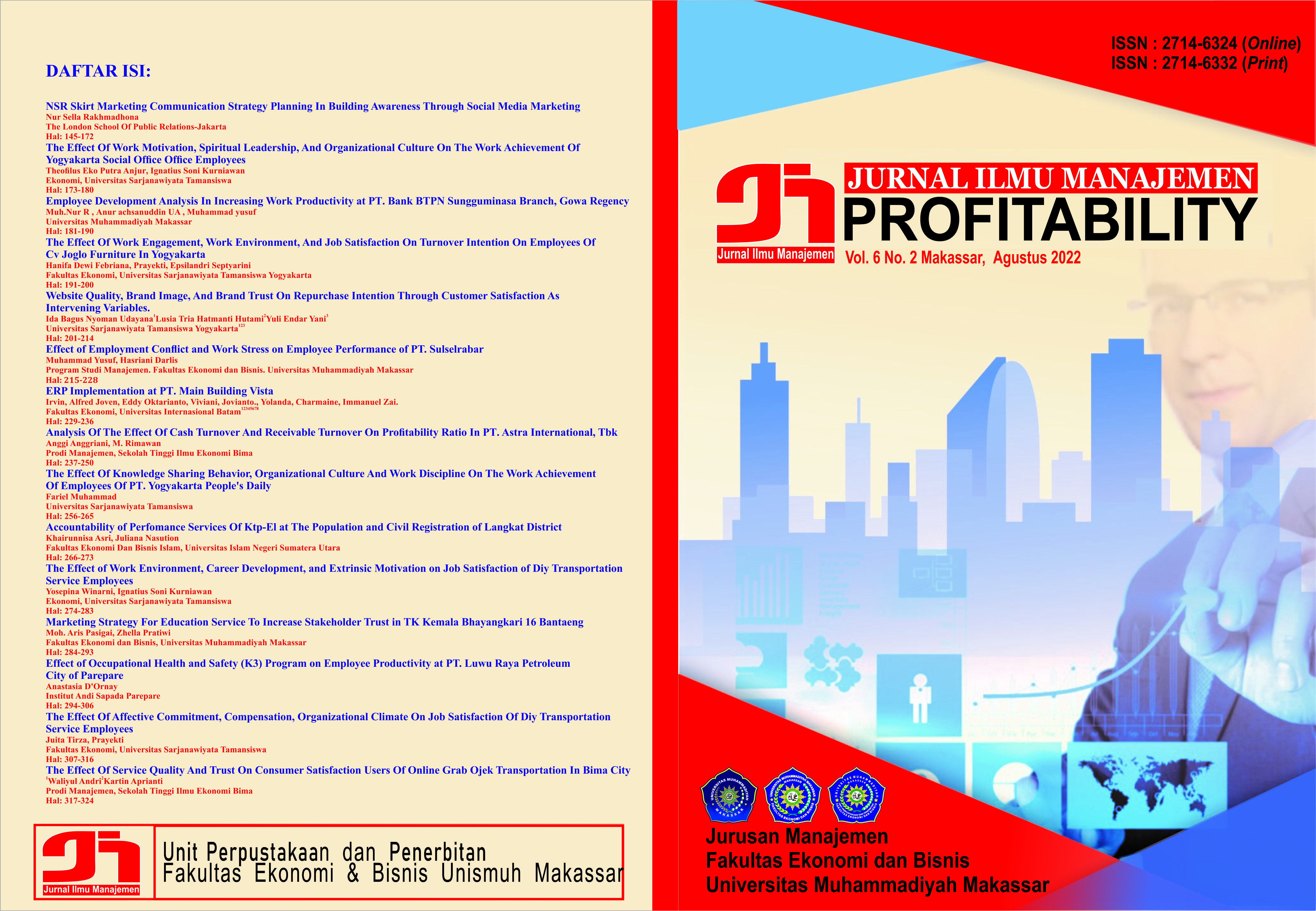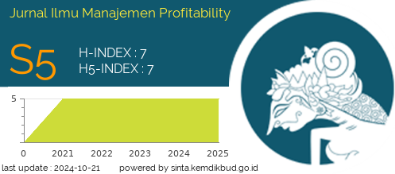The Role of Environmental Responsibility and Community Support in Halal Tourism Development
DOI: https://doi.org/10.26618/profitability.v9i1.16518
Halal tourism, Social-Ecological Systems, environmental responsibility, community support, Structural Equation Modeling
Abstract
This study investigates the role of environmental responsibility and community support in shaping perceptions of halal tourism through the Social-Ecological Systems (SES) Theory. Using Structural Equation Modeling (SEM) and a survey-based approach, data were collected from 300 respondents across three major halal tourism destinations in Indonesia: Lombok, Aceh, and West Sumatra. The findings reveal that community support significantly influences the perception of halal tourism, highlighting the importance of cultural alignment and local participation in tourism development. Additionally, environmental responsibility positively affects perceptions of halal tourism, suggesting that sustainable practices enhance the sector’s appeal. The study emphasizes that integrating ecological concerns with community engagement fosters a more inclusive and sustainable halal tourism model. These insights contribute to the growing discourse on sustainable tourism, offering practical implications for policymakers and industry stakeholders in designing effective halal tourism strategies. By aligning tourism development with environmental stewardship and local community interests, halal tourism can achieve long-term success while maintaining cultural and ecological sustainability.References
Ainin, S., Feizollah, A., Anuar, N. B., & Abdullah, N. A. (2020). Sentiment analyses of multilingual tweets on halal tourism. Tourism Management Perspectives, 34, 100658.
Al-Ansi, A., Olya, H., & Han, H. (2023). Two decades of research on halal hospitality and tourism: a review and research agenda. International Journal of Contemporary Hospitality Management, 35(6), 2017-2055.
Berakon, I., Wibowo, M. G., Nurdany, A., & Aji, H. M. (2023). An expansion of the technology acceptance model applied to the halal tourism sector. Journal of Islamic Marketing, 14(1), 289-316.
Chakraborty, A. (2021). Can tourism contribute to environmentally sustainable development? Arguments from an ecological limits perspective. Environment, Development and Sustainability, 23(6), 8130-8146.
Elegbede, I. O., Fakoya, K. A., Adewolu, M. A., Jolaosho, T. L., Adebayo, J. A., Oshodi, E., ... & Abikoye, O. (2023). Understanding the social–ecological systems of non-state seafood sustainability scheme in the blue economy. Environment, Development and Sustainability, 1-32.
Gursoy, D., Chi, C. G., & Dyer, P. (2010). Locals’ attitudes toward mass and alternative tourism: The case of Sunshine Coast, Australia. Journal of travel research, 49(3), 381-394.
Jafar, A., Qadri, A. Q., & Husna, A. (2024). Worldwide Research on Halal Tourism: A Bibliometric Analysis. Journal of Business and Economic Analysis, 1-23.
Juliana, J., Pramezwary, A., Yuliantoro, N., Purba, J. T., Pramono, R., & Purwanto, A. (2021). Perceptions, Attitudes, and Interests of Halal Tourism: An Empirical Study in Indonesia. The Journal of Asian Finance, Economics and Business, 8(7), 265-273.
Nofandi, A., Hutapea, R. H., & Aziz, F. A. (2023). Implementation Of Halal Tourism In East Nusa Tenggara: A Christian Education Perspective. Penamas, 36(2), 305-322.
Nunkoo, R., & Ramkissoon, H. (2011). Developing a community support model for tourism. Annals of tourism research, 38(3), 964-988.
Ostrom, E. (2009). A general framework for analyzing sustainability of social-ecological systems. Science, 325(5939), 419-422.
Rahman, M., Rana, M. S., Hoque, M. N., & Rahman, M. K. (2019). Brand perception of halal tourism services and satisfaction: the mediating role of tourists’ attitudes. International Journal of Tourism Sciences, 19(1), 18-37.
Ribeiro, M. A., Pinto, P., Silva, J. A., & Woosnam, K. M. (2017). Residents’ attitudes and the adoption of pro-tourism behaviours: The case of developing island countries. Tourism Management, 61, 523-537.
Pradhita, D. (2024). Intersection of Islamic Values and Consumer Preferences. Advances in Business & Industrial Marketing Research, 2(1), 15-25.
Ratnasari, R. T., Gunawan, S., Mawardi, I., & Kirana, K. C. (2021). Emotional experience on behavioral intention for halal tourism. Journal of Islamic Marketing, 12(4), 864-881.
Rasul, T. (2019). The trends, opportunities and challenges of halal tourism: a systematic literature review. Tourism Recreation Research, 44(4), 434-450.
Sharpley, R. (2014). Host perceptions of tourism: A review of the research. Tourism management, 42, 37-49.
Tu, J., Luo, S., Yang, Y., Qin, P., Qi, P., & Li, Q. (2021). Spatiotemporal Evolution and the Influencing Factors of Tourism-Based Social-Ecological System Vulnerability in the Three Gorges Reservoir Area, China. Sustainability, 13(7), 4008.
Downloads
Published
Issue
Section
License
Authors who publish with Jurnal Ilmu Manajemen Profitability agree to the following terms:
Copyright of the articles remains with the authors.
Authors grant the journal the right of first publication with the work simultaneously licensed under a Creative Commons Attribution-NonCommercial 4.0 International License (CC BY-NC 4.0). This license allows others to:
Share (copy and redistribute the material in any medium or format)
Adapt (remix, transform, and build upon the material)
as long as they give appropriate credit to the original author(s) and source, provide a link to the license, and indicate if changes were made. Non-commercial use only.
Authors are permitted to:
Distribute their published work (e.g., post it to an institutional repository or publish it in a book), with an acknowledgment of its initial publication in this journal.
Enter into separate, additional contractual arrangements for the non-exclusive distribution of the journal’s published version of the work (e.g., post it to a class website or institutional archive).
For permissions to use the content published in this journal beyond the scope of the license (e.g., commercial purposes), please contact the editorial office via the journal email.
License Details:
This journal is licensed under a Creative Commons Attribution-NonCommercial 4.0 International License (CC BY-NC 4.0).












